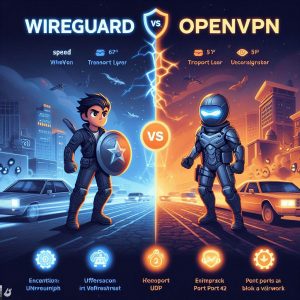Introduction
A Virtual Private Network (VPN) is a technology that allows users to securely access a private network over the internet. When connected to a VPN, all of the user’s internet traffic is routed through an encrypted tunnel to the VPN server.
The main purpose of using a VPN is to hide one’s identity and browsing activity from internet service providers (ISPs), websites, snoopers, and even government agencies. By masking a user’s IP address and encrypting their web traffic, VPNs provide increased privacy and anonymity online.
What a VPN Hides
When connected to a VPN, several aspects of a user’s online activity are hidden from outside parties:
- IP Address and Location: One of the main things a VPN hides is the user’s IP address, which can be used to identify their location. Websites normally see the IP address assigned by the VPN service, concealing the user’s actual IP address and location.
- Browsing History: By routing and encrypting traffic through a VPN server, the user’s browsing history is hidden from their ISP, WiFi network operator, websites they visit, and snoopers. This includes web pages visited, files downloaded, videos streamed – basically all internet activity.
- Online Activities from ISPs and Snoopers: Whether the user is accessing blocked content, engaging in P2P sharing, streaming pirated media etc – VPNs hide these activities from ISPs, copyright watchdogs, hackers and government agencies. Without a VPN, ISPs have insight into all traffic that goes through their servers.
So in summary, VPNs allow users to browse the web privately by hiding their IP address, encrypting traffic, and obscuring browsing history from multiple entities.

Limitations of VPNs in Hiding Browsing History
However, there are some limitations in a VPN’s ability to completely hide browsing history, including:
- Partial Hiding from Google: While VPNs prevent Google from linking web activity to an IP address or location, Google is still able to record search history tied to a Google account. Browsing history can be seen under “Web and App Activity” in a Google account.
- Browser History Still Visible: The default browsers on most devices – Chrome, Firefox, Safari – also maintain a history of pages visited within the browser itself. So while outsiders can’t see this history, it is still viewable on the device unless manually cleared or set to not record history.
- ISPs Can Detect VPN Usage: Although ISPs cannot see what activity occurs within a VPN tunnel, they are still able to detect VPN usage on their networks. ISPs can see increased data usage and can deduce that a customer is using a VPN.
So in essence, VPNs hide browsing history from external parties but some VPN limitations exist like leakages through search history, browser history still being recorded locally, and ISPs detecting VPN usage through traffic patterns.
Can VPNs See Internet Activity?
Since VPN services route all user traffic through their servers, it raises the question – can VPN providers monitor, record and track browsing history if they choose?
The answer is complex:
- Technically VPNs Could Monitor Activity: VPN software has the ability to inspect, record, and log all traffic that passes through their servers. They have the capability to act like an ISP or network administrator.
- Reputable VPNs Do Not Keep Logs: The best and most trustworthy VPN providers, however, explicitly state they do not monitor or store user activity logs. This is vital to avoid compromising customer privacy. VPNs without logs cannot link internet activity to any one user.
- Legal Implications Exist: While the majority do not record logs, VPN providers can face legal obligations to begin recording user activity. Through court orders or government requests, some VPNs have had to enable logging or have been seized to obtain user data. This possibility exists at least in theory.
So in summary – reputable VPN providers make guarantees not to monitor or log traffic as it would entirely defeat the purpose of a VPN. But the technical capacity exists, and some legal scenarios can compel logging as well.

Ensuring Privacy with a VPN
To ensure maximum privacy and true anonymity online through a VPN, the following practices are vital:
- Choosing a Trustworthy VPN: Not all VPN services are equal when it comes to privacy protection. It is critical to only use a provider that has unambiguous no-logs guarantees, preferably with trust seals from reputable auditors. Services like ExpressVPN, NordVPN excel on this count.
- Encryption of Traffic: Private VPNs use bank-grade AES-256 bit or stronger encryption to render internet traffic entirely undecipherable to outsiders. This prevents browsing data from being intercepted and decrypted. Using OpenVPN or WireGuard protocols ensures robust encryption.
So by selecting a VPN with reliable no-logging policies and deploying watertight traffic encryption, any potential privacy or security vulnerabilities can be minimized. Audit records, transparency reports, and technology like kill switches also enhance privacy. In this manner tracking of browsing history can be prevented to a large extent.
Conclusion
To summarize, while VPNs provide vital protection of browsing history and online activity from ISPs, websites and external trackers, some minimal vulnerabilities exist that prevent a 100% privacy guarantee. Leakages through account history, browser data and IP address masking detection mean connection logs theoretically could still occur.
However, by picking a trustworthy no-logs VPN provider with state-of-the-art encryption, users can be assured of the best possible privacy. For the average user wanting enhanced anonymity online, reputable VPN services greatly minimize privacy risks and tracking of browsing behavior, providing vital peace of mind.
I. Introduction to VPN and ISP
A Virtual Private Network (VPN) serves as a encrypted tunnel between your device and the wider internet, hiding your online activities and true IP address from external parties. Internet Service Providers (ISPs) on the other hand assign IP addresses that identify your device and can potentially monitor or log information about sites you visit and data you send or receive online. Both play key roles in modern internet use – one in protecting privacy, the other in enabling access.
When considering whether VPN hide internet activity from ISPs, understanding both their functionality and limitations is key. We’ll explore what exactly VPN hide, methods ISPs use to still potentially identify VPN traffic, alternative tools to VPN, and considerations around using reputable commercial VPN versus free options. Read on for greater insight around the question of whether VPN can truly hide your online activity from internet providers.

II. What Does a VPN Hide?
At a basic level, VPN services obscure two critical pieces of identifying user data from ISPs and the wider internet: your IP address and your traffic itself.
A. Hides Real IP Address
By establishing an encrypted tunnel between your device and a remote VPN server, your connection gets routed through that server, masking your true public IP address assigned by your ISP. Instead, only the IP address of the VPN server itself is visible to external parties like your ISP or sites you visit. This prevents them determining your location or identity based on the IP address.
B. Encrypts Internet Traffic
In addition to hiding the user’s IP, VPN also encrypt internet traffic by default before it leaves the local device using protocols like OpenVPN or IKEv2. This encrypts the actual content of the sites visited and data sent/received so that ISPs have no visibility into what the user is actually doing online. Only the VPN provider itself has access to decrypt user traffic data.
This dual-layer protection of both hiding the originating IP and encrypting actual internet content provides substantial privacy protections from external monitoring. Many individuals leverage VPN connections when using public Wi-Fi or torrenting copyrighted material to prevent network administrators or government agencies observing those activities directly. VPN thereby limit visibility not just for ISPs but any wider observers.
III. Can an ISP See Through a VPN?
While VPN provide vital protection and anonymity online, there are still methods available for ISPs to potentially identify VPN use and user traffic despite encryption mechanisms:
A. Monitoring Data Packet Travel
Even when unable to access the encrypted contents of traffic, ISPs remain able to monitor the data packet size and frequency moving back and forth from a user’s connection to VPN servers. This VPN metadata and usage pattern analysis can allow inference into the type of traffic or activity occurring while using the VPN tunnel.
Sustained and substantial data packet flows may indicate bulk downloading or streaming for example. Spikes in activity could signify gaming or video calling usage. So while unable to directly observe traffic content itself, metadata patterns still provide hints.
B. Identifying VPN Server Addresses
ISPs maintain databases of known VPN provider IP addresses and hosting ranges which they can crosscheck traffic against to identify VPN usage on their networks. Traffic to or from these flagged ranges clearly indicates a subscriber is actively utilizing a VPN. The specific identity would still remain hidden given VPN IP obfuscation, but the ISP could confirm VPN usage itself.
Depth and sophistication of these VPN identification methods depend heavily on the specific ISP and their data mining priorities. But in short – advanced techniques exist to deduce user activity despite VPN encryption protections.

IV. VPN Alternatives and Considerations
Beyond commercial VPN services, some alternative options also exist:
A. Tor Network
The Tor browser routes traffic through multiple encrypted proxy layers for maximum anonymity. While effective at obscuring traffic, speeds suffer greatly compared to typical VPN. The encryption can also raise red flags to ISPs and invites deeper traffic analysis.
B. Residential Proxies
Utilizing thousands of residential IP addresses as exit points for traffic can also mask user origins. However these lack built-in encryption mechanisms by default without additional tools. Proxies also fail to hide traffic from the proxy provider itself, introducing privacy risks.
Ultimately both carry more limitations compared to commercial VPN options broadly available today. However some users layer VPN and Tor connections together for maximum ISP evasion and traffic masking capabilities despite steep speed trade-offs.
A common piece of advice often overlooked is avoiding entirely free VPN services. If not paying for the product, user data itself often becomes the product. This introduces substantial privacy risks and removes assurances or accountability around logging policies for these services. Reputable paid providers offer greater transparency and protections.

V. Conclusion
There exists an arms race between ever-advancing commercial VPN encryption capabilities and sophisticated data mining efforts by state agencies and private ISP alike. No solution yet guarantees absolute and permanent obscurity from traffic monitoring and inference efforts. Constant evolution is still required to stay a step ahead.
VPNs undoubtedly provide the fastest and most easily accessible solution for the average consumer privacy needs today. When leveraged correctly, they limit the ability of ISPs to directly monitor the sites you visit and content you consume online. For individuals focused on masking activity from prying ISP eyes, reputable VPN bring measurable protections.
However some persistent surveillance efforts can still identify VPN usage itself and make deductions around traffic patterns despite lacking specifics. No options remain future-proofed against ever improving tracking capabilities globally by state and corporate analytics alike.
As such users must remain vigilant in selecting trusted VPN providers establishing reliable and accountable protections aligned to their privacy priorities. Blind faith fails to account for the array of existing methods that squeeze through the cracks of VPN shields. Combining informed provider selection with safe browsing and downloading habits stands as the most prudent approach to balancing security, functionality and freedom online.
I. Introduction
The United Arab Emirates (UAE) has established itself as a major economic and technological hub in the Middle East. However, the country also enforces strict internet censorship policies and surveils digital activity heavily. Popular apps like WhatsApp, Skype, and Viber have faced blocks in the past along with many news and political sites. Even legal entertainment streaming sites like Netflix are frequently inaccessible.
To bypass these restrictions and gain online privacy, using a virtual private network (VPN) has become a necessary reality for many UAE residents and visitors. Dubai and Abu Dhabi especially see high VPN usage to encrypt internet traffic and bypass censorship. However choosing the right VPN for Dubai involves unique considerations around local network infrastructure and legal stipulations of VPN and proxy use within the UAE.
Below we explore the best Dubai and UAE-optimized VPN options, discuss why VPN adoption is critical locally, evaluate legality aspects, and provide configuration tips for getting a UAE IP address abroad.
II. Best VPNs for Dubai and the UAE
Due to heavy VPN blocking within most internet service providers (ISPs) across the UAE, it takes robust VPN protocols and infrastructure to reliably bypass restrictions. Here are top choices:
1. ExpressVPN
ExpressVPN consistently ranks as the fastest and most reliable solution in the Gulf region. Using next-gen protocols like Lightway and Wireguard, their VPN overcomes typical UAE blocks. Servers across 94 countries, unlimited bandwidth, and 256-bit AES encryption provide ample cover for daily use.
2. NordVPN
NordVPN offers high speeds via their NordLynx protocol coupled with port forwarding and obfuscation tools well-suited for the UAE internet landscape. User-friendly apps, double VPN servers, and a no-logging policy provide extra privacy assurances.
3. CyberGhost
Available for under $3 monthly, CyberGhost combines affordability with streaming access and Tor-over-VPN servers that evade Middle East blocks effectively. As an added bonus, dedicated streaming profile settings simplify unlocking restricted content.
For accessing region-locked content abroad, connecting to a UAE-based server location will assign the user a local IP address. CyberGhost, ExpressVPN, and NordVPN have extensive UAE server coverage to enable smooth streaming.

III. Reasons for Using a Dubai VPN
Expats and locals within the UAE turn to VPN services for several key reasons:
1. Access Blocked Websites & Apps
Using a Dubai VPN allows bypassing ISP blocks on apps like Skype, WhatsApp, Viber, FaceTime, and Google Hangouts. Popular sites such as Reddit and those with political themes or adult content also face routine blocking but remain accessible via an encrypted VPN tunnel.
2. Safeguard Communications
Many foreign residents rely on messaging apps like WhatsApp to stay in touch with family abroad. By encrypting traffic, a trustworthy VPN prevents third-party snooping on these private conversations, an increasing concern given expanding state cybersecurity laws.
3. Stream Restricted Content
Video sites like Netflix, Hulu, BBC iPlayer, HBO Max impose region restrictions that limit UAE access. Connecting through a VPN assigned UAE-based IP address evades geoblocks, granting full access from anywhere globally.
4. Public Wi-Fi Security
Dubai hotels, malls, airports and coffee shops feature plenty of free public hotspots. But using them poses major security risks without protection. VPN encryption shields public WiFi use against man-in-the-middle attacks by hiding data and online activity.
IV. How to Get a UAE IP Address
Assigning your device a UAE-based IP address enables bypassing geolocation restrictions to access region-locked sites and content. Follow these steps:
- Select VPN Provider
Choose a provider like NordVPN/ExpressVPN with extensive UAE-based servers. Account creation involves just an email and password.
- Install & Connect
Download the VPN app for your desired device, log into your account, and connect with one click. The easiest option is enabling auto-connect.
- Pick UAE Server
Within the VPN app, browse server lists for the UAE location closest matching your needs – Dubai, Abu Dhabi, Ras Al Khaimah etc.
- Confirm UAE IP
Check IP address within browser after connecting. UAE IP confirms successful location masking suitable for geo-spoofing to access restricted sites and streaming platforms.
Advanced users can optionally specify OpenVPN/Wireguard protocols for added stealth, enable DNS/IPv6 leak protection, and activate “Multi-hop” routing to further hide traffic. But out-of-the-box apps provide enough functionality for most Dubai users.

V. Legality of VPN Use in the UAE
No definitive federal laws explicitly ban VPN usage outright across the UAE. However legal use cases remain narrow given confusing cybercrime codes and degrees of enforcement varying by emirate. Recent proxy/VPN licensing schemes also create ambiguity so caution is advisable.
Category 1 violations seem to target commercial fraud, online scams, terrorist communications or pornography more heavily currently. Individuals utilizing privacy tools without malicious aims generally fly under the radar albeit in legal gray territory. As always obeying local restrictions around restricted sites and content applies regardless of VPN usage.
For visitors especially, sticking to reputable VPN providers using protocols less prone to outright blacklisting should suffice. Residents face more uncertainty however. Treading carefully and avoiding any illegal online activity despite VPN usage remains critical either way until clearer legislation emerges.
VI. VPN Protocols That Work in the UAE
Heavy-handed censorship efforts make VPN blocking commonplace across UAE internet providers like Etisalat and Du. Still many reliable protocols continue providing smooth access:
OpenVPN – Open-source workhorse protocol boasts widespread support across clients and VPNs thanks to reliability. However deep packet inspection efforts can throttle OpenVPN traffic.
Wireguard – Utilizing state-of-the-art cryptography and codebase, Wireguardbetter resists throttling and blocking. Its performance strengths suit the UAE well.
SoftEther – Multiprotocol VPN built atop SSL supports OpenVPN, L2TP, SSTP configurations. Its plugin architecture bypasses restrictions via obfuscation.
Shadowsocks – Though not a pure VPN itself, Shadowsocks’ use of proxies and encrypted data channels satisfy VPN use cases like bypassing firewalls effectively. Finding trustworthy providers is key however.
Tor Over VPN – Routing traffic first through Tor and then VPN adds an extra layer of encryption unrecognizable to censors. But speeds suffer greatly, making everyday use impractical.
As UAE authorities expand technological measures inhibiting VPNs, providers continually evolve new evasion tactics in response. Selecting well-reviewed services using next-gen protocols works best to stay a step ahead of potential blocks.

VII. Conclusion
From accessing blocked apps and sites to safeguarding communications and securing public WiFi use, virtual private networks serve as vital digital lifelines for many UAE residents and visitors alike. As censorship technology progresses however, finding VPN capable of bypassing ever-stricter ISP controls poses deepening challenges.
Still, reputable providers using fresh protocols and obfuscation tactics continue reliably delivering encrypted tunnels capable of evading regional firewalls. Carefully abiding by local IT laws however remains paramount when utilizing VPN services within any Middle East nation, given harsh penalties and legal uncertainty if used for truly criminal means.
But for expatsMissing home entertainment offerings, small businesses reliant on censored communications tools, or parents helping children bypass school internet filters, purpose-built UAE VPN provide much needed respite within the restrictive digital environment of the Gulf today.
As the use of personal VPN and firewall circumvention software continues normalizing globally, eventually authorities must acknowledge unrestricted digital access as an essential pillar of innovation and human development rather than a automatically suspect security threat. Until attitudes shift however, technical stopgaps like VPNs customized for maximum UAE penetration provide vital lifelines to online liberty for many. Tread carefully but fearlessly onwards.
I. Introduction
Virtual Private Networks (VPNs) have become an increasingly popular tool for protecting one’s privacy and security online. Typically, VPNs are separate applications that users must install and configure to route their device’s internet traffic through an encrypted tunnel. However, a new approach has emerged recently – web browsers with built-in VPN services.
These browsers aim to provide the privacy and security benefits of using a VPN without requiring a separate application. Users simply enable the VPN feature within the browser settings and their traffic is routed through the VPN without any other configuration needed. As using public Wi-Fi poses numerous risks, browsers with integrated VPN services can help secure these connections.
With data breaches and surveillance increasingly common online, there is a growing emphasis on privacy-preserving tools. Browsers with built-in VPN represent an innovative way to bake these protections directly into one’s daily internet use.
II. What are Browsers with Built-in VPN?
Browsers with built-in VPN refer to web browsers that have integrated Virtual Private Network functionality without requiring a separate VPN app. When the VPN feature is enabled, all traffic routed through the browser is encrypted and tunneled through a remote server, hiding the user’s IP address and location.
Unlike standalone VPN apps that protect device-wide traffic, browsers with built-in VPN only secure the traffic within that specific browser. However, for many users, a browser may represent the majority of their internet use. As such, having a VPN integrated directly can still provide substantial privacy and security protections.
Given the prevalence of unsecured public Wi-Fi networks, using a browser’s built-in VPN when connecting to hotspots can greatly reduce risks. By encrypting and rerouting the traffic, the user’s data and activity is hidden from potentially compromised networks. This makes browsers with integrated VPN well-suited for use on the go.

III. How to Use Browsers with Built-in VPN
Using a browser with built-in VPN functionality is meant to be simple and straightforward for users. Here is a step-by-step guide:
- Install and open the browser with the integrated VPN feature. Popular options include Opera, Epic Privacy Browser, and Brave.
- Locate the VPN settings, usually under a “Protect Privacy” or “Secure Connection” menu. Toggle the VPN to the “on” position to activate it.
- The browser should connect to an available VPN server automatically based on fastest connection or load balancing. Some browsers allow users to select specific server locations.
- Most browser VPNs initiate encryption protocols like HTTPS Everywhere automatically to further protect traffic when enabled. No other user intervention is typically needed.
- To disable the VPN, simply toggle the switch back to the “off” position. Disabling tabs temporarily disconnects that tab from the encrypted VPN tunnel as well.
- Take note of any speed reductions or website compatibility issues that arise while browsing with the VPN active and determine if troubleshooting is required.
The entire process aims to be quick and user-friendly, allowing anyone to easily activate additional privacy and security protections while web browsing. Limitations may include reduced speeds or limited choice of server locations compared to standalone VPN services. But for basic security needs, especially on public Wi-Fi, browser integrated VPNs provide an easy path to greater safety.
IV. Best Browsers with Built-in VPNs
Given growing interest in online privacy tools, several major web browsers now integrate VPN functionality with different approaches:
A. Opera
- Opera launched one of the first browsers with baked in VPN in 2016. Their mobile and desktop browsers include a no-log, unlimited free VPN.
- 256-bit AES encryption secures traffic along with IP/DNS leak protection. Users can select VPN server locations across the Americas, Europe, and Asia.
- Connection speeds are fast enough for most browsing needs. Side-by-side testing shows comparable speeds to Chrome and Firefox during typical web use.
B. Epic Privacy Browser
- Epic focuses heavily on privacy protections including adblocking, tracking/cookie blocking, and fingerprint obfuscation.
- Their VPN uses bank-grade AES 256 encryption channeled through servers located in privacy-friendly jurisdictions. For free users, servers are limited to Netherlands, Canada, and Sweden.
- Strict no-logging policies are followed. Epic also offers an affordable paid upgrade option to unlock unlimited speed and worldwide VPN servers if needed.
C. Brave
- Brave takes an open-source approach and utilizes the TunnelBear VPN network within its privacy-centric browser. Server options span 16 countries currently.
- Strong 256-bit AES encryption is used to secure traffic between the browser and remote VPN servers. Users have options to select specific server locations or default to automatic.
- As an open-source browser, Brave emphasizes transparency in their operations. Their VPN offering focuses on basic security and privacy needs rather than advanced configurations.

V. Why You Shouldn’t Use a Browser with Built-in VPN
Despite the lightweight convenience of built-in browser VPNs, there are some downsides to consider:
A. Limited Features
Most browser VPNs focus exclusively on routing and encrypting web traffic. They lack other common VPN features like P2P support, split tunneling, or multi-platform clients. Browser VPNs complement but don’t replace full-featured services.
B. Narrow Protection
By only encrypting web traffic, browser VPN leave other device activity vulnerable. Apps, network traffic, downloads, and system-level functions are still exposed. For robust device-wide coverage, standalone VPN applications are better suited.
C. Potential Compatibility Issues
Websites utilizing geofencing filters may block access from common VPN server locations like the US or Netherlands. Browser VPNs can also interfere with region-restricted video streaming. These compatibility issues force some users to disable their VPNs periodically.
For power users that rely on advanced settings customization or non-browser VPN functionality, utilizing a browser-based option alone may not meet their full security and privacy needs. Viewing them as a supplemental line of defense rather than the only solution is most prudent.
VI. Outline VPN
First launched in 2018 by Alphabet subsidiary Jigsaw, Outline VPN represents a unique, open-source option for those seeking a free and easily accessible browser VPN solution.
A. Overview
Outline VPN currently uses Shadowsocks protocol to route encrypted traffic through a network of 700+ volunteer-run servers around the world. By handling encryption on the client side and keeping little user data, Outline aims to provide basic VPN functionality while maximizing user privacy.
The service is available as a standalone app for Windows, Mac OS, Linux, iOS and Android. Browser extensions for Chrome and Firefox also exist. All options are fully free and open-source, using community-driven development to expand features.
B. Distinction from Traditional VPNs
Unlike traditional VPNs that rely on a centralized network of commercial servers, Outline takes a crowd-sourced, decentralized approach. Volunteer-run servers backed by donation revenue handle most traffic globally. The open-source codebase ensures transparency and trust for users wary of logging policies.
By handling encryption client-side before traffic enters remote servers, Outline limit’s volunteers visibility into user activity for greater privacy. Their unconventional model represents an alternative to closed-source commercial VPNs.
C. Privacy & Encryption Focus
Outline places extreme emphasis on trust, transparency, and privacy for its users. As Jigsaw is an Alphabet subsidiary, assurances against activity logging or data harvesting are paramount. Encrypted client-side handled by freely audited open-source code aims to provide that.
For basic traffic tunneling and IP masking, Outline VPN provides an accessible option for users focused on privacy. However, more advanced users may desire options with greater configurability or more feature-rich functionality.
VII. Security & Privacy
Fundamentally, the largest value proposition of any VPN, including browser integrated options, lies in their ability to enhance security and privacy during internet use. By encrypting traffic and masking IP addresses, VPN establish secure tunnels designed to hide online activity.
A. Encryption Importance
Outlined earlier, all reputable browser VPN solutions rely on robust end-to-end AES 256-bit encryption at a minimum. Encrypting data before it leaves the local device keeps information hidden from the open internet. This prevents ISPs or hackers on public networks from intercepting meaningful data about user activity.
B. Maintaining Privacy
In addition to encryption, routing traffic through remote VPN servers also conceals the user’s real IP address and location. This provides greater anonymity online, hiding geographical identifying details. User data thereby enjoys greater privacy compared to unprotected internet connections.
C. Public Network Protection
On open Wi-Fi connections in coffee shops, airports, hotels etc, browser VPN become hugely valuable. Local network threats are increasingly commonplace, making public hotspots prime targets for attackers. A browser VPN adds vital protection against man-in-the-middle attacks or packet sniffing by malicious actors when on unsecured networks.
In an era of increasingly sophisticated cybercrime, browser VPN bring quick, convenient security that protects against a wide range of privacy threats. They represent a vital first line of defense while web browsing.

VIII. Conclusion
As virtual private networks grow in popularity worldwide, innovative browsers have begun baking simplified VPN functionality directly into their products with just a click. Browsers with integrated VPN tools, whether paid or free, offer measurable privacy and security advantages.
When enabled, these VPN establish encrypted tunnels that hide traffic from local network threats and internet service providers alike. This helps curb data harvesting and protects sensitive user information. With public Wi-Fi risks increasing exponentially yearly, integrated browser VPN can serve as an accessible safeguard while mobile.
However, users must weigh the limitations around region restrictions, site blocking, and in some cases reduced speeds. Advanced VPN users desiring customized configurations or expanded platform support may still prefer standalone VPN clients. Nonetheless, for general privacy protections while browsing, simplified browser VPN provide significant value with minimal hassle.
As our digital ecosystem grows more threatening amid rampant data collection, any tools that place privacy back in users’ hands deserve consideration. Browsers with built-in VPN functionality shine new light on this emerging need – meeting users where they already are. With further development, integrated VPN may one day feature as a core pillar of safe, ethical internet practice alongside the rise of privacy-focused browsers like DuckDuckGo, Brave and more.
Introduction
Peer-to-peer (P2P) file sharing encompasses the distributed transfer of digital media and data directly between participant nodes rather than through central servers. BitTorrent technology in particular revolutionized public P2P transfers by allowing users to simultaneously upload and download fragments of files from one another to accelerate total distribution.
However copyright disputes inevitably dogged popular P2P protocols as unlicensed copies of movies, music and software spread rapidly without commercial compensation. Outdated legal remedies then began targeting not just initial file sharers but also downstream participants passively distributing bits through torrent swarms.
Potential six or even seven figure damages terrified households from even basic file sharing despite many jurisdictions recently introducing more reasonable enforcement. But the technical foundations of P2P sharing which eliminated production/distribution bottlenecks so effectively couldn’t easily get suppressed entirely either.
This is where VPN (Virtual Private Network) connectivity emerged as a compromise for continuing to nurture innovation built atop platforms like BitTorrent without leaving individuals legally exposed. Encrypting P2P traffic anonymizes both uploading and downloading users to outside observers through layers of AES 256 bit protection.
While paid commercial VPN providers optimize performance, some decent free options worth considering exist too for cost-conscious users. We’ll review the tradeoffs between premium and freemium tiers when selecting a VPN for P2P usage across factors like speed, security and server locations below.
Best Free VPNs for Torrenting and P2P File Sharing
Juggling complex technical configurations shouldn’t pose barriers preventing everyday people from leveraging technology conclusively proven to foster creativity and edge case innovation. Fortunately several capable free VPN providers extend flexible P2P and BitTorrent support to cost-sensitive users for legal shielding without payment hurdles.
TunnelBear
TunnelBear VPN pitches itself on userfriendliness boasting a visual design identity compared to Pixar films. But don’t let the cutesy bear mascot fool you – TunnelBear delivers fully-featured VPN protection behind the fun facade including unlimited P2P usage on its modest free subscription plan.
Although capped at a scant 500MB monthly, this data allowance proves enough for very light usage across only a single device. Paying a reasonable $3 monthly raises allowances to a still tight 1.5GB suitable for basic web browsing when judiciously monitored. But unlimited paid plans cost only $10 monthly for robust peace of mind supports driving P2P innovation.
ProtonVPN
Already renowned for operation by the same respected team behind encrypted email providers ProtonMail, ProtonVPN makes available a gratis VPN tier facilitating P2P transfers without payment. In exchange for viewing ads or participating in community crowdsourcing efforts, users gain access to the same stringent privacy policies of top-tier competitors here absolutely free.
Speeds do remain capped on free plans and server selection limited to just three countries. But unlimited bandwidth (within reasonable fair use) provides flexibility accommodating both torrenting and general private browsing needs. Forking over $5 monthly jumps available countries up to eight while enhancing streaming speeds. For power users preparing sizable archives for public distribution though, the paid Plus plan really optimizes performance.
NordVPN
Claiming among the largest server networks worldwide through over 5400 VPN nodes across 59 countries, NordVPN thoroughly dominates most industry recommendation lists for those prioritizing speed. Although managing torrent distribution at scale practically necessitates opting into a paid NordVPN subscription, the company wisely offers an unconditional 30 day free trial for new users to experience those best-in-class connection speeds risk-free.
Specialized servers fine tuned for P2P transfers ensure users gain access to optimized hardware best suited for heavyweight torrenting purposes right off the bat. Smart DNS proxy services are also available to facilitate geo-dodging abilities and bypassing blackout restrictions across video streaming sites worldwide regardless of where users connect through NordVPN.
Atlas VPN
Brought to the world by the same team renowned for NordVPN above, Atlas leverages that industry expertise to deliver a compelling free VPN tier subsidized partially by ads but crucially allowing P2P connectivity. Across Windows and Android platforms using IKEv2 protocol connections, access to over 500 servers in 27 countries won’t exactly blast files at top speeds but does help get budding projects off the ground.
As the smallest provider featured Atlas VPN holds the most risk of clamping down on policies friendlier toward P2P users as their network inevitably grows. But for now they deliver not just torrenting permissiveness but also unlimited monthly data usage – a rare combination among free VPNs. Savvy users can employ Atlas as among available no-cost connection options while proactively line up contingency migrate plans if eventual P2P prohibition emerges down the road.
Windscribe
Marketing itself as a VPN solution for circumventing censorship implemented by repressive regimes around the world limiting speech, Canada-based provider Windscribe gifts every user 10GB of monthly data allowance encompassing P2P and file transfer usage alike with no further strings attached. Beyond the generous complimentary data cap, configurable client apps and browser extensions provide vital insight into which tools in your internet freedom toolkit might attempt accessing the wider web unprotected.
Without even requiring user registration Windscribe still comprehensively covers the basics through AES-256 and SHA512 protection across OpenVPN and IKEv2 VPN protocols. One catch lies in if your usage happens to exceed the allotted 10GB monthly ceiling, speeds will throttle substantially compared to paid plans unless you reboot the billing cycle manually through their website. But cost-conscious users valuing PC innovation needn’t necessarily break the bank here.
Risks and Disadvantages of Using a Free VPN
While effective P2P networks rely fundamentally upon internode openness, transparency and collaboration, the realities of capitalist human economy necessitate most legitimate commercial VPN providers impose some critical restrictions. Users evaluating free subscriptions should clearly understand several inherent disadvantages before funneling significant traffic through minimally tiered accounts:
No Torrenting Support
The most crippling yet understandable limitation hampering many free VPN subscriptions lies in completely blocked BitTorrent/torrenting and similar P2P protocols from even functioning across their infrastructure let alone doing so speedily. This allows companies to avoid accusations of promoting piracy.
Data and Speed Limitations
Beyond outright P2P/BitTorrent prohibition, further restrictions stingy free VPN subscription plans commonly enact include tiny monthly data caps hardly enough for web browsing let alone media sharing alongside intentionally throttled connection speeds negating any P2P usefulness.
Limited Server Choice
The cost of operating premium infrastructure across 59 excellently-located countries as highlighted in the NordVPN review above can’t possibly recoup through ad support alone. Hence most free tiers concentrate connections through just a handful of locations rarely ideal for P2P file distribution.
Thankfully the emerging freemium models of TunnelBear, ProtonVPN and even Windscribe manage lifting some weightier restrictions. But users ready to genuinely scale file sharing through VPN distribution absolutely require an unlimited paid subscription with reliable connections ample for the public communities depending on them.
Free Torrenting VPNs to Avoid
While functional free VPN tiers do warrant consideration under the right limitations given economic mobility barriers keeping reliable privacy perpetually out of reach, a handful of extremely dubious “free” VPNs completely undermine digital security through fundamentally flawed configurations vulnerable to exploitation:
Hola VPN
Spanish-developed Hola VPN trades access in exchange for voluntarily sharing portions of your home bandwidth and internet connection with other users as an exit node when idle. The peer-to-peer exchange effectively allows anyone to sell access to the internet utilizing your IP address rather than their own.
This well-intentioned concept aimed at improving access equality through grassroots infrastructure sharing however merely compromises all participants by negating personal privacy, risking abuse via traffic exits and providing fertile ground for freeloaders to game available resources.
Conclusion
P2P technology holds proven capacity cultivating decentralized innovation across digital spaces through empowering everyday users with distribution authority once exclusively held by large central intermediaries. Downstream court rulings penalizing mere file transfer likewise reveal a desperate need for legislative revamps balancing reasonable commercial creator incentives amended to exclude disproportionate end-user liability.
Until necessary reforms emerge however, individual internet participants unfortunately assume legal risks exploring open distributed connection frontiers without adequate anonymity safeguards in place. Budget VPN layers handing off such exposure to commercial entities instead make accessible useful privacy protections for users weighing financial constraints. Carefully constructed free tiers help democratize entry for curious newcomers as well when crafted conscientiously with fair usage limits given economic justification.
However large scale P2P operations distributing sizeable loads of torrents or similar files realistically require unlimited high speed plans correctly prioritizing security just as much as raw throughput. Value shopping VPN specifications against reliability metrics and ethical provider reputations (favoring user privacy over monetization) helps identify which solution best fits given needs and means.
Introduction
Using BitTorrent to download or seed files has become a minefield of potential legal and privacy risks in recent years. Your internet service provider (ISP) monitors traffic across shared networks aggressively for copyright violations and illegal file transfers now.
Additionally, joining public torrent swarms directly exposes your IP address to potentially countless random peers also downloading the files. This opens you up to monitoring, profiling and even direct attacks on your device leveraging exposed IP details.
Employing a VPN service while torrenting anonymizes traffic by hiding your home IP address and encrypting data transfers. However most recognized paid VPN providers explicitly prohibit torrent transfers across their networks or severely limit speeds and monthly allowances if permitted at all.
Thankfully several reputable free VPN services still facilitate anonymous Peer-to-Peer file sharing without invasive tracking, advertising or unfair limitations. Let’s examine leading options offering truly unrestricted access.
Best Free VPNs for Torrenting
The minority of free VPN providers accommodating BitTorrent usage typically impose frustrating data caps, connection throttling or insecure protocols jeopardizing your privacy. However a handful of competent options buck this trend while still protecting user identities and download habits.
PrivadoVPN
PrivadoVPN earns top marks for permitting torrent transfers under their free subscription tier without imposing data limits or log retention. Access remains unlimited across five countries after creating a simple account.
However free users do face stifled speeds capped at just 1 Mbps. And advanced features found with paid tiers go missing like added VPN protocols or port forwarding. Nonetheless the truly unlimited bandwidth even at reduced speeds provides workable flexibility ideal for Cost Per GB (CPG) conscious torrenters on a budget.

hide.me
Boasting truly unlimited torrent bandwidth across all subscription tiers including their free service makes hide.me a rarity in the space. No invasive tracking, advertising or even account registration gets required to start shielding your IP address using their global network either.
hide.me VPN does cap free subscriber locations to just two countries and forces connects through congested Server Message Block (SMB) tunnels instead of faster OpenVPN connections reserved for paying users. But unlimited transfer allowances without account creation helps offset the speed limitations.
Atlas VPN
The generous free tier offered by Atlas VPN (from the same team behind leading paid provider NordVPN) offers an unlimited volume of torrent downloads each month across three select countries. Convenient browser extensions and mobile apps keep connections smooth across devices too.
However their free subscription only permits OpenVPN protocol connections lacking special obfuscation tricks to better mask VPN usage on restrictive networks. And expectations need set appropriately around the generosity likely declining long-term as their userbase grows. But for now Atlas VPN torrents freely under a reliable globally distributed provider.
Windscribe
Canada-based Windscribe pitches itself as a VPN solution for circumventing government censorship to increase access to information globally. Their browser extensions and apps provide 10GB of monthly data allowance to free members encompassing file transfers.
While not unlimited, Windscribe’s torrent permissiveness and generous free data caps offer reasonable flexibility when combined with convenience features like handy browser integration. Just keep a watchful eye that large downloads don’t unintentionally eat your precious 10GB in days then slow your speeds substantially until the next billing cycle.
Risks of Using Free VPNs for Torrenting
While the preceding free VPN providers earn recommendations for embracing torrenting, most services offering free subscriptions seek to actively deter or prohibit file sharing entirely across their networks citing legal and capacity factors. Those permitting torrent access under free-tier plans also frequently introduce frustrating limitations minimizing their usefulness:
Limited Security Features
To drive upgrades to premium subscriptions, free VPN subscribers often lose access to crucial security enhancements that guard privacy most when downloading torrents.
Missing protections may include reduced encryption strength, allowing only the oldest VPN protocols, blocking port forwarding essential for optimizing BitTorrent speeds, or eliminating access to dedicated P2P optimized servers.
Advanced features like multi-hop connections across countries or IP address cycling also help mask torrenting usage from prying ISPs. But these rarely appear in stripped-down free tiers focused monetizing data mining and advertising instead.
Strict Restrictions on Data Usage
While the previous highlighted VPN providers deliver reasonable unlimited or large traffic allowances under free subscriptions, limitations remain the norm industry-wide otherwise.
Tiny monthly data caps below 10GB rapidly dissipate across a few torrent downloads. Slower server connections also intentionally throttle speeds substantially after reaching thresholds promoting premium upgrades.

Device Compatibility
Accessing free VPN tiers often requires installing an invasive proprietary app on each device which logs activity, serves disruptive advertising and transmits analytic user data back to parent companies.
Compatibility issues also arise frequently for routers, media streaming devices, gaming consoles and older operating systems using outdated VPN protocols unsupported in stripped-down free offerings focused exclusively on Windows/macOS/iOS/Android clients.
Advanced users lose flexibility connecting multiple devices especially across integrated network hardware common in homes.
Responsive Customer Support
Free subscribers universally receive downgraded technical support either through lackluster self-help knowledge bases and forums or only basic troubleshooting assistance questions through email.
Technical issues frequently crop up during torrent transfers across VPN tunnels from port blocking to temporary disconnections. Lacking real-time chat/phone support inevitably slows restoring full speeds or security. Prioritizing upsold premium subscribers for assistance remains understandable from a business perspective but degrades free user experiences still.
How to Use a VPN for Torrenting
Once selecting an appropriate free or premium VPN subscription suited to handling torrent loads, leveraging your traffic encryption manually across sites only takes a few simple steps:
- Select a VPN Service
Browse reputable review aggregations like RestorePrivacy to shortlist leading VPNs tailored specifically to nurturing BitTorrent transfers through tools like port forwarding, P2P servers, and unlimited plans.
- Check that your VPN is Working
Initiate a connection to your chosen VPN network on the device handling the downloading then confirm encryption is securely active through the client dashboard before proceeding.
- Visit a Torrenting Website
Access popular torrent portals like RARBG, 1337x or The Pirate Bay to search out the files you wish to download over the now secured and anonymous VPN tunnel.
- Download the File
Click the magnet link or torrent file to open it in a BitTorrent client app like uTorrent or qBittorrent with port forwarding enabled, then observe speeds and progress once peers connect via the VPN.
Following this sequence creates an encrypted tunnel from your device through the VPN server out to general internet traffic, including torrent swarms. This masks your actual home IP address from being publicly visible to copyright enforcement agencies or other untrusted members downloading the file.
Free VPNs to Avoid
While a handful of free VPN services accommodate torrenting admirably despite inherent speed and allowance limitations, countless dubious providers promote exaggerated claims around absolute free access. But the reality exposed in opaque terms and conditions coupled with troubling privacy practices warrant avoiding these types of shady services altogether when torrenting:
Invasive Tracking & Analytics
Many free VPN browser extensions analyzed by researchers were caught trafficking sensitive data regarding all sites visited back to parent analytics servers unbeknownst to users. This destroys user anonymity by building invasive usage and behavior profiles.
Cryptocurrency Mining Abuses
Several free mobile VPN apps dishonestly consumed unreasonable device processing cycles surreptitiously powering cryptocurrency mining operations profiting the developers through users’ electricity bills and hardware wear without consent.
Connection Tracking & Logging
While claiming true privacy protection and IP masking, various free VPN companies actively analyze account access details and traffic activity, then sell these profile analytics through shadowy data partnerships. Always scrutinize logging and jurisdiction policies.

Manipulative Upselling Tactics
Signup processes for free VPN access frequently layer on deceptive promotional screens steering unaware users into auto-recurring paid memberships above the base free tier. Buried terms perpetuate expensive monthly billing until going through tedious cancellation routines.
Misleading Speed Claims
Free tiers promising unlimited bandwidth often deliver only a frustrating trickle of data capped around 250 Kbps in reality. Or temporary speed tests display inflated rates that drop substantially under normal usage to incentivize upgrades.
Unfortunately the market remains flooded with dubious free VPN providers engaging in these sorts of shady activities largely targeting less savvy users. Scrutinizing their operations thoroughly before transmitting any sensitive traffic remains essential to avoid regrets.
Conclusion
Investing in a premium VPN subscription still proves the most prudent long-term approach toward torrenting securely across various devices while retaining responsive customer service backing. Nonetheless a small number of ethical free VPN solutions deliver reasonably flexible P2P support without crude efforts optimizing around monetized user data mining.
Evaluating factors like true download limits, number of countries offered, simultaneous device support and whether intrusive ads permeate the experience helps identify legitimate options possible to recommend to friends and family interested primarily in basic torrent access.
Ideally free tiers give newcomers a viable initial impression of the VPN reliability in their geographic area while longstanding paid members enjoy access to faster speeds and expanded features. Striking this balance holds the key to sustainable zero-log services gaining mainstream trust for protecting torrenting habits without compromising principles.
Well constructed unlimited free VPN tiers with incentives nudging power users toward properly monetized premium subscriptions can symbiotically broaden acceptance of tighter security habits across less tech savvy markets. Positioning access as a universal right for all rather than luxury for technically skilled elites guides the community toward empowering paradigm shifts benefiting Internet citizens worldwide.
Introduction
Virtual Private Networks (VPNs) have become an essential tool for protecting your privacy and security online. VPNs work by encrypting your internet traffic and routing it through a server operated by the VPN provider. This hides your IP address, provides anonymity, and prevents snooping or tampering with your data.
However, the degree of security and privacy offered by a VPN depends largely on the protocol it uses. The VPN protocol governs how your device connects to the VPN server and determines factors like speed, encryption strength, and compatibility. Two of the most popular VPN tunneling protocols today are WireGuard and OpenVPN. Comparing them directly helps identify the advantages of each.
WireGuard represents an exciting modern VPN protocol employing state-of-the-art cryptography. It promises faster connections with simplified configurations using leaner code than legacy counterparts like OpenVPN. However OpenVPN enjoys widespread support across platforms thanks to its longevity and open-source foundations.
Evaluating both protocols across vital metrics like speed, security, and ease-of-use reveals the strengths and limitations inherently tied to these radically different technologies.
Background of WireGuard and OpenVPN
Before examining the two protocols head-to-head, understanding their origins provides helpful framing and context. Their divergent histories also inform the contemporary functionality built into WireGuard and OpenVPN implementations.

What is a VPN Protocol?
A VPN protocol refers to the underlying method and rules a VPN service uses to encapsulate your traffic then transport it securely between devices through encrypted tunnels across the internet. VPN protocols handle authentication plus data encryption and packaging processes before routing everything through intermediary servers and onto the public web transparently.
Leading protocols include OpenVPN, IKEv2/IPSec, L2TP, WireGuard and others. Providers typically deploy multiple protocols across servers to maximize version compatibility with diverse customer devices like Windows PCs, iPhones, Android tablets and Linux systems.
History of WireGuard
Born out of frustration with legacy business-focused VPN products, open-source hobbyist and security researcher Jason A. Donenfeld began work on an entirely new VPN protocol in 2015 aimed at consumer usability. Leveraging cutting-edge cryptography like Curve25519 for key exchange and ChaCha20 for encryption, Donenfeld crafted WireGuard as an extremely simple yet highly secure tunneling solution.
Favoring simplicity in both visual interface and back-end code complexity, WireGuard finally launched for the Linux kernel in 2018. Translation layers now enable WireGuard support across many operating systems from mobile to desktop platforms although native integration remains ongoing work-in-progress. Backed by buzz and academic review the protocol continues rapid open-source development as it challenges commercial alternatives.
History of OpenVPN
Evolving in the open-source community since 2001, OpenVPN helped pioneer the commercial VPN industry as we know it. Lead programmer James Yonan built on existing standards like SSL/TLS encryption to craft an encrypted tunneling system for securely connecting distant network locations across the public internet.
This revolutionary concept enabled remote users to privately access home or corporate networks through encryption powerful enough to guard sensitive data yet straightforward enough for novice users. OpenVPN soon became the preferred platform for many commercial solutions thanks to its balance of user-friendliness, strong cryptography and cross-platform availability. Continued open-source oversight keeps the platform updated against modern vulnerabilities.
Speed and Efficiency
Any VPN introduces some degree of connection overhead by tunneling through remote servers and encrypting all traffic. However measurable performance reduction varies drastically across protocols and implementations.
As a modern build engineered for efficiency from scratch, WireGuard benchmark testing confirms drastically faster speeds than OpenVPN thanks to cleaner code and lighter processing requirements. Real-world usage also reflects significant speed boosts from WireGuard compared to legacy VPN tunnels.
WireGuard Performance
Boasting commercial performance alongside experimental protocols like ZVPN, WireGuard easily ranks as one of the fastest VPN tunnel options thanks to technical design choices by Jason Donenfeld optimizing the protocol for both desktop and mobile deployments.
Utilizing only around 4,000 lines of code total, WireGuard massively reduces background bloat compared to the hundreds of thousands lines underpinning most VPN platforms. This compact efficiency allows WireGuard encrypted packets to transmit faster using less device resources. Minimizing cryptography to just three essential elements also streamlines processing needs for faster throughput.
Built on a lightweight principle model geared for high-performance devices and modern multi-core architecture, WireGuard handles encryption calculations faster using improved algorithms. Reduced latency and packet overhead also enhances connection speeds. Primitive cryptographic building blocks power maximum throughput optimized for the mass market rather than corporate tunnels.

OpenVPN Speed
While historically fast for its time thanks to SSL/TLS foundations, OpenVPN connections suffer noticeable speed losses in 2022 compared to leading protocols like WireGuard or IKEv2. Still utilizing relic encryption algorithms from the 1990s like BF-CBC, OpenVPN just can’t keep pace with modern innovations in cryptography and connection handling.
Nonetheless, OpenVPN technology still gets regular improvements through ongoing open-source development. New implementations integrate some faster ciphers like AES-GCM and enable multi-threading for better multi-core scalability across devices. Legacy technical debt however hampers peak speeds.
On Windows systems in particular, OpenVPN performance lags due to dependence on the Tap adapter virtual interface for tunneling. This adds considerable overhead compared to other protocols leveraging more efficient native VPN APIs built directly into newer operating systems like Windows 10 and Android.
Security and Privacy
Underpinning any VPN system lies its cryptographic engine securing traffic flowing through tunnels. Both WireGuard and OpenVPN build protection utilizing encryption, hashing and authentication across all connections. Comparing their differing approaches side-by-side showcases their respective security strengths.
WireGuard Security
Delivering state-of-the-art crypto primitives was Jason Donenfeld’s top priority for engineering WireGuard as the world’s most robust VPN tunnel solution. To that end WireGuard relies on just three lean algorithms:
- Curve25519 handles public/private key generation and exchange for setting up the encrypted session
- ChaCha20 provides symmetric encryption of session traffic using 256-bit keys
- Poly1305 seals encrypted packets with authentication to confirm validity
Leveraging elliptical Curve25519 for session establishment allows perfect forward secrecy so intercepted keys can never be reversed to decrypt previous communications. Meanwhile fast ChaCha20 streaming cipher encryption protects packet contents without compromising speed through bulkier outdated ciphers. Each encryption layer gets sealed using Poly1305 integrity checks preventing tampering.
The careful minimalist combination of these three elements specifically chosen by Donenfeld provides state-of-the-art encryption with little room for vulnerabilities according to researchers. Backing these algorithms with constant open-source community code review also ensures optimal hardening against emerging attack vectors.
OpenVPN Encryption & Security
Supporting a wider array of legacy encryption options provides OpenVPN broader compatibility but also increases chances of weakened protection across outdated cipher selections. However OpenVPN does enable strong ciphers like AES-256 considered unbreakable by modern computing power.
Other available OpenVPN ciphers prove substantially weaker in contrast either using slimmer 128-bit keys (BF-CBC) susceptible to brute-force attacks or relying on discredited algorithms like ARC4. Though newer cipher implementations help, OpenVPN inherits a heavy legacy encryption burden compared to the uniform cutting-edge default encryption built into WireGuard.
OpenVPN configurations must also juggle far more moving parts across authentication mechanisms, pre-shared keys, digital certificates and encryption cipher combinations – each introducing potential weak links attackers could exploit through incorrectly matched components or information leaks exposing secret keys.
Compatibility and Support
Due to its considerably younger age, WireGuard so far lacks the extensive platform support built over decades across OpenVPN implementations. However WireGuard installation does provide superior ease-of-use and minimal configurations thanks to cleaner integrated code requiring no external modules or certificates.
WireGuard Compatibility
As an experimental new protocol, native WireGuard integration just recently landed across Linux, Android and Windows platforms with iOS/macOS adoption still pending (but available using third party apps). Nonetheless handy command line tools and GUI clients help enable compatibility across most devices.
The open-source development community continues actively working on WireGuard ports for many platforms however to yet match the ubiquity of OpenVPN. Initial focus centered on robust Linux support before expanding availability to other common systems. Despite starting from scratch in 2015, impressive WireGuard adaptations and performance already match VPN incumbents feature-for-feature in many regards.

OpenVPN Platform Support
Thanks to origins tracing back decades before smartphones, OpenVPN enjoys broad cross-platform support across countless devices and operating systems. Convenient installers exist for Windows, Linux distributions, iOS and Android alongside routers, NAS devices and more.
Dedicated apps providing OpenVPN connectivity also abound across mobile and desktop environments while third parties package the open-source code into countless commercial solutions. OpenVPN’s age and accessibility provides a long legacy advantage over upstart WireGuard in terms of baked-in system integration and pre-configured client accessibility.
Configuration Comparison
Configuring OpenVPN requires cobbling together various external components (encryption ciphers, auth chains, keys) and troubleshooting multiple potential failures between mismatched pieces. WireGuard eliminates these pain points by consolidating everything required internally using unified state-of-the-art cryptography and streamlined code requiring minimal user input.
Getting started with OpenVPN can prove daunting across platforms due to certificate authority setups, SSL/TLS handshakes and advanced configuration editing needed across servers and client devices. In contrast WireGuard simplifies connections by uniquely identifying peers through public/private key pairs for straightforward yet robust authentication and session encryption.
Conclusion
Reviewing the historical strengths of OpenVPN built over decades along with the modern concise efficiency of WireGuard highlights the advances made securing VPN architectures right alongside encryption technology itself. While OpenVPN still delivers proven and widely-compatible performance, upstart WireGuard outpaces it across speed, security and simplicity metrics – albeit with some platform compatibility tradeoffs.
For those choosing a VPN provider today that balances robust privacy protections with blistering connection speeds across devices, WireGuard makes an attractive protocol choice over dated OpenVPN technology in most use cases. However OpenVPN still owns an advantage in niche scenarios prioritizing certified implementations or aging hardware with finicky firmware.
Both open-source protocols will continue evolving over years to come thanks to public scrutiny and development contributing steady improvements. OpenVPN appears likely though to gradually cede market dominance to faster modern successors including WireGuard once platform support reaches parity. And WireGuard’s state-of-the-art underpinnings already provide ample speed and security today across all major platforms like Windows, Mac, iOS, Android and Linux for most personal and commercial VPN applications.
Introduction
VPN tethering refers to connecting one device to another via a VPN in order to access the internet. This allows users to route their tethered device’s internet traffic through a VPN tunnel for enhanced privacy, security and accessibility.
Tethering enables internet connectivity by sharing a host device’s mobile data or existing Wi-Fi network with other linked devices. Combining tethering with a VPN adds powerful layers of encryption, anonymity and circumvention technology.
VPN tethering proves extremely valuable for securing public hotspots, accessing blocked content globally, and saving money compared to purchasing multiple standalone data plans. However some technical know-how helps ensure optimal compatibility and performance.
How VPN Tethering Works
A VPN, or Virtual Private Network, works by routing your internet traffic through an intermediary server run by the VPN provider. This encrypted tunnel keeps your browsing history, identity and device details private while allowing you to change your virtual location.
Tethering provides networked connectivity between devices over several standard interfaces like Bluetooth, USB cables or dedicated hotspots. Smartphones for example can share their mobile data allowance with other nearby gadgets like laptops and tablets.
Chaining these technologies together lets a primary tethering device like a phone first funnel its own traffic through a VPN tunnel. Any secondary gadgets tethered to the phone can consequently piggyback through the same secure encrypted tunnel to access the wider internet.
This daisy-chaining effect routes all tethered devices through the same VPN endpoint before exiting to the public web. The VPN encryption shades the originating IP addresses allowing users to avoid surveillance, unblock geo-restricted sites and retain anonymity across gadgets.

Benefits of VPN Tethering
Tethering devices through a VPN conduit confers several valuable advantages:
Enhanced Security and Privacy
Tethering opens up networked access between devices which can expose sensitive data to snooping if unprotected. Funneling all traffic through a VPN tunnel provides a top-tier solution for locking down that connectivity via strong 256-bit AES encryption. VPN tethering essentially converts any public network into a secure private network instantly.
Bypassing Geo-Restrictions
Certain internet content gets restricted based on geographical location including streaming platforms like Netflix or BBC iPlayer. VPN tethering allows you to select server endpoints in other supported countries, effectively making all tethered devices route through that country virtually. This grants full access to region-exclusive content.
Cost Effectiveness
Paying for multiple standalone mobile data subscriptions can get extremely expensive, especially when traveling internationally. Tethering through a VPN allows devices to share one data plan for significant cost savings. Just connecting one phone to a VPN hurts nothing, while mobile hotspot subscriptions are pricey.
Technical Considerations
While VPN tethering opens up incredible possibilities, achieving smooth integration hinges on a few key technical factors:
Compatibility
Tethering compatibility depends on hardware, operating systems and permission settings across host and client devices. Enabling hotspot tethering on an iPhone to share with Windows laptops works seamlessly for example. But sharing an Android phone connection with another Android device involves more steps. VPN compatibility also varies across platforms.
Network Performance
Any speed loss from VPN encryption gets compounded across multiple daisy-chained devices relying on the same tunnel. Connect just one directly to the VPN when possible, then funnel additional devices through the primary one as a hotspot for efficiency. Also choose VPN protocols like WireGuard that optimize performance by reducing latency and packet overhead.
Potential Challenges
From connection drops to Byzantine captive portal pages when joining hotspot networks, tethering poses some headaches. Running VPN drain device batteries rapidly too. Enabling Wi-Fi sharing selectively when needed saves power and data usage for less friction. Also check VPN provider allowance policies, some prohibit tethering entirely or impose additional fees.

Setting Up VPN Tethering
Despite a few configuration hurdles, setting up VPN tethering only takes a few steps once you know the way:
Android
- Enable hotspot tethering in network settings 2. Connect directly to VPN service app 3. Connect other devices to hotspot network
iOS (iPhone)
- Enable Personal Hotspot under Settings > General > VPN 2. Turn on VPN tunnel from Control Center 3. Join Personal Hotspot network from other devices
Windows PC
- Establish LTE/5G or Wi-Fi internet connection
- Create mobile hotspot network in network settings
- Connect to VPN service on PC
- Allow other devices to access new hotspot network
Handy third party apps like NetShare and MyPublicWiFi also simplify tethering across devices and operating systems while integrating VPN connectivity.
For best results, connect the primary tethering device directly to the fastest VPN protocol like WireGuard or OpenVPN via UDP. Then let additional laptops, tablets and phones leverage the existing VPN session through the host device for maximum speeds.
Troubleshooting and Best Practices
Like any chain, VPN tethering remains weakest at its most fragile link. Following these tips keeps each aspect working reliably:
Common Issues
- Connection timeouts from VPN disconnects
- Hotspot verification texts not arriving
- Battery drain or data overages
- Geo-blocks still restricting content
Solutions
- Enable Wi-Fi assist feature for failover connectivity
- Add phone number to wireless carrier account
- Set data limits and disable hotspot when not needed
- Configure VPN protocol setting for highest consistency
Best Practices
- Favor WireGuard for fastest speeds
- Tether VPN connection only when necessary
- Test blackout restricted content working before trips
- Reboot devices to flush previous network settings
Also check VPN provider policies before tethering connections. While most support VPN tethering either officially or unofficially, some prohibit it in terms. Others place artificial connection limits unless you utilize one of their custom configured apps.
Finally evaluate your cellular data plan’s hotspot allowance before routing multiple devices through your smartphone’s VPN connection. Wireless carriers often charge exorbitant fees for excessive hotspot data consumption so track this closely.
Use Cases and Applications
VPN tethering supports several advantageous real-world applications:
Business and Professional Use
Companies issue laptops to employees needing internet access while traveling abroad where roaming charges would otherwise paralyze budgets. By tethering devices through VPNs instead, they slash costs by preventing international plan overages. Creative industry professionals like photographers also benefit from more securely offloading or backing up images remotely.
Personal Privacy and Security
Public Wi-Fi networks in coffee shops, hotels and airports remain notoriously easy for hackers to exploit. Tethering gadgets through a trusted VPN platform secures multiple devices simultaneously whenever connecting, preventing snooping or session hijacking.
Global Accessibility
Certain regions block access to apps and websites by default due to censorship policies. Journalists and bloggers count on VPN tethering while reporting abroad to tunnel around firewalls for coordinating with sources or publishing content openly. Activists also organize this way.

Conclusion
In closing, tethering devices via VPN delivers multifaceted advantages beyond the sum of its parts. Users gain secure encrypted connections safeguarding data across gadgets while benefiting from expanded global access. Technically proficient “road warriors” in particular find excellent reliability and cost savings from VPN tethering while jetting around the world.
With more countries expanding targeted censorship and surveillance programs however, these combination techniques only grow in importance for empowering free unfiltered access. As supporting hardware and software continue maturing on both the virtual private networking and tethering fronts, the barriers between devices dissolve, leaving only seamless unified access.
Evaluating privacy protection, budgetary value, network performance and global reach reveal VPN tethering as an essential modern toolkit for life online anywhere. Whether defending personal data in transit or accessing content across continents, chaining your devices through a reliable VPN hub keeps critical communication conduits open.
Introduction
A VPN (Virtual Private Network) is an essential tool for protecting your privacy and security online in today’s digital world. VPNs work by creating an encrypted tunnel for your internet traffic, hiding your identity and preventing monitoring or tampering. Understanding how VPN protocols utilize specific ports is key to troubleshooting connection issues and customizing your VPN setup.
VPNs route your device’s internet traffic through an encrypted tunnel to a remote server operated by the VPN provider. This protects your traffic from prying eyes on public WiFi and allows you to bypass geography-based content blocks to access region restricted sites. The VPN port is like a virtual doorway that this encrypted tunnel uses to communicate with the VPN server.
Knowing common VPN ports helps diagnose connectivity problems faster. Some network firewalls block less common ports too, making port selection an important factor when setting up a VPN. Whether connecting from a router, laptop, phone or other device, understanding VPN ports better optimizes security and performance.

How VPN Ports Work
VPN tunneling protocols like OpenVPN, IKEv2 or WireGuard use assigned TCP or UDP ports to route encrypted traffic to the VPN server and out to the public internet. A port serves like an address, telling the system where to direct incoming and outgoing network packets.
Without port assignments, packets wouldn’t know which application to access – web browsers, email, or in this case the VPN tunneling protocol. Ports allow many types of traffic to flow simultaneously over the same network connection. Reserved port numbers are standardized across operating systems and types of devices.
When configuring your device to connect with a VPN, it establishes a secure session using the chosen protocol and port. The VPN client software encrypts your local traffic then wraps it in packets marked for the reserved VPN port number. That outgoing traffic gets forwarded through the VPN tunnel to eventually reach its destination.
Return packets also utilize the established VPN port to traverse the tunnel back and get decrypted by the VPN client. The whole looping process relies on the stability and availability of whichever port numbers are defined in the VPN implementation.
Admins can customize VPN ports if needed to avoid conflicts or work around blocks. Changing ports may also enhance obfuscation or load balancing depending on network infrastructure. However, sticking to conventional ports is generally best for out-of-the-box compatibility.
Common VPN Ports
Certain ports have become standard defaults across major VPN platforms and tunneling protocols. Using these well-known ports instead of obscure ones reduces headaches down the line. Here are the most widespread VPN ports you’ll encounter:
1194 TCP/UDP – OpenVPN, one of the most popular VPN protocols, commonly uses UDP port 1194 by default. This port offers a good balance of speed and stability. TCP port 1194 also sees some use for OpenVPN traffic that prioritizes reliability over performance.
TCP 443 – This standard HTTPS port gives OpenVPN traffic more stealth as it blends in better with encrypted web browsing. Using port 443 for OpenVPN can also bypass firewalls in restrictive networks more easily. However, routing too much VPN bandwidth over HTTPS ports can negatively impact web performance.
500 UDP – The IPsec protocol favored by Apple for iOS and macOS devices utilizes UDP port 500 for VPN connectivity. The IKEv2 variant of IPsec may use this port as well. As an older VPN standard, IPsec enjoys wide compatibility with routers, firewalls and other networking equipment.
1723 TCP – Even legacy VPN platforms like Microsoft’s PPTP still see some use today across outdated devices and protocols. PPTP passes encrypted traffic over port 1723 by default, though security experts no longer recommend this outdated method.
Certain VPN providers may use alternate custom ports by default instead for proprietary reasons or added security through obscurity. But in most cases, the ports listed here act as the standard gateways for their respective VPN tunnel systems.

Unsafe VPN Ports to Avoid
While the ports discussed so far remain secure and widely supported, other non-standard ports have questionable levels of protection. Some shady free VPNs or outdated products rely on ports that are vulnerable to exploits, blocking or bandwidth throttling.
For context, a networking port is simply a 16-bit number used to direct traffic to the appropriate application service on a host. Ports under 1024 fall into the well-known range administered by the Internet Assigned Numbers Authority (IANA). On the opposite end, ports above 49151 occupy the dynamic/private range.
In between those ranges are the registered ports (1024-49151) like those commonly used by VPNs as covered earlier. Designating application traffic to registered ports allows devices communicating across a network to interoperate smoothly and predictably.
By default, your operating system handles port connections under the hood. But quirky network policies can interfere with badly chosen ports. For example, an authoritarian regime may actively block ingress to known VPN ports as an attempt to restrict access. Using an esoteric high-number port instead might seem clever but draws scrutiny to your traffic and introduces other problems.
Websites and devices aim to whitelist only secure ports instead of wasting resources checking every single numbered port. Little-used ports outside the registered range therefore get blocked more frequently by default. Obscure ports also tend to lack support documentation for troubleshooting and negotiation timeouts. For these reasons it’s smarter to stick with standardized VPN ports whenever possible.
Customizing VPN Ports
Despite potential downsides, there remain valid cases for using a non-standard custom VPN port. Enterprise network administrators may choose uncommon ports strategically to avoid overloading bandwidth on registered ones. Changing ports also adds an extra layer of security through obfuscation, preventing casual port scanning from detecting the VPN gateway.
If your VPN provider offers apps across various devices, custom ports ensure connectivity across firmware platforms with restrictive policies. For example older network storage devices or firewalls often only whitelist low ports under 1024. Switching OpenVPN to use port 443 instead can work around such limitations.
When selecting a non-default VPN port, take care to choose one less likely to get blocked arbitrarily in transit. For example, port 8080 resembles normal web traffic enough to avoid suspicion but has enough distinction to evade blanket HTTP restrictions. Experienced VPN users can also opt to run the OpenVPN protocol over SSH on port 22 for an extra layer of encryption.
For utmost connectivity, using the default port for your VPN platform still proves hard to beat however. If no blocked ports or firewall incompatibilities exist, the standard ports mentioned earlier typically offer the most seamless networking experience. Changing ports introduces opportunities for ISP traffic shaping or timeout errors whenever the server or client can’t negotiate promptly.
In the majority of personal and business VPN use cases, modifying ports provides no substantial benefit. Often it just raises the likelihood of connection hiccups down the road. But skilled IT teams can still leverage custom ports judiciously to avoid congestion on registered alternatives or obscure activity based on internal usage statistics.

Conclusion
In closing, understanding exactly how your Virtual Private Network leverages protocols and ports remains an invaluable skill for troubleshooting issues or tailoring configurations more granularly. Standard VPN ports like 1194 or 500 should cover most usage cases reliably while allowing traffic to masquerade as normal benign activity.
Avoid falling into the trap of using shady free VPNs or outdated products relying instead on makeshift ports and protocols. Doing proper research into your provider’s security policies and implementation remains vital for identifying any vendor shortcomings early on. Top-tier services like NordVPN and ExpressVPN shine here by offering widespread protocol support across devices using mainstream dependable ports by default.
Paying attention to VPN ports might seem like a highly technical topic at first. But just memorizing the common port numbers used by popular protocols already goes a long way for analyzing problematic connections methodically. Custom config tweaks adjusting ports carry legitimate benefits in some advanced network deployments too.
Hopefully this breakdown better equips you to make sense of any VPN connectivity quirks encountered down the road on various devices. While we all connect to the internet differently based on our individual needs, using strong VPN password practices alongside secure protocols and ports serves as the best starting point for protecting that access.
Introduction
Having a New Zealand IP address opens access to internet content specifically geared towards Kiwi users while traveling or living overseas. Since websites determine your location based on your device’s IP address, masking it with a New Zealand IP allows bypassing geo-restrictions to access services you otherwise couldn’t from abroad locations.
The easiest way to securely get a IP address from another country is by using a VPN (Virtual Private Network). VPNs assign you a new IP based out of their international server network, letting you digitally relocate on demand virtually. As interest grows globally around New Zealand culture, landscapes and entertainment, using a VPN while overseas remains the top method for still viewing exclusive local content.

Step-By-Step Guide on How to Get a New Zealand IP Address Abroad with a VPN
Following these straightforward steps will connect you through a New Zealand-based IP using a VPN:
1. Choose a Reliable VPN Provider Offering New Zealand Server Locations
The quality of your experience hinges on the capabilities of the VPN service you select. Consider features like:
- Number of high-speed New Zealand servers available
- Unlocks top NZ streaming sites like TVNZ, NEON, Sky Go
- Strict no-logs privacy policy to prevent tracking
- Allows torrenting/P2P filesharing
- Works reliably in China and past firewalls
Top tier recommendations specific for NZ access include ExpressVPN, CyberGhost, NordVPN and Private Internet Access VPN.
Once registered with your chosen provider, install & login to their VPN app that manages connections.
2. Download and Install The VPN Software Onto Your Device
VPN providers offer native apps for all operating systems and mobile/desktop platforms so you can secure every type of device:
- Windows – Download installer from VPN site to configure their VPN client
- Mac – Drag provider’s Mac app into Applications folder
- IOS – Find VPN app on Apple App Store
- Android – Get VPN app from Google Play Store
- Linux – Follow provider’s Linux installation instructions
Some also have router firmware or browser extensions to cover other connection scenarios seamlessly.
3. Launch The VPN App and Connect Through an Available New Zealand Location
Opening the provider’s VPN app displays all international location options to route your traffic through – scroll and select an available New Zealand server. This could be a location like Auckland, Wellington or Christchurch depending on app.
The quick connect functionality built into most VPN services makes establishing a secured tunnel painless with a single click, activating newly configured local IP in seconds.
**4. Verify Your New Zealand IP Address Got Assigned Properly **
Confirming successful IP allocation completes the location change process through validating your updated virtual spot shows as originating inside New Zealand now:
- Websites like IPLocation.net clearly flag your country if set correctly
- WhatIsMyIPAddress.com displays fresh locality details
- Tools within VPN app signal NZ IP status
If still showing old region, try reconnecting or manually selecting another NZ server to reinitialize the VPN tunnel.
5. Enjoy Unrestricted Access Privileges Now Available With Your New Zealand IP Address
Now that your internet traffic is securely funneled through an IP address assigned from New Zealand, geo-blocks and regional access limits imposed on content normally unavailable internationally gets lifted – you have unlimited abilities to:
- Stream shows on TVNZ, NEON and other libraries
- Listen to New Zealand radio broadcasts
- View NZ news & sports sources overseas
- Shop online at nz retailers that restrict intl customers
- Run internet searches via Google NZ
- Access software, games and assets only for Kiwi users
Using a New Zealand-based IP via VPN now fools any website into thinking you are located locally, unlocking all location-exclusive features the country enjoys natively to expats abroad instantaneously!

Benefits of Using a VPN to Get a New Zealand IP Address Abroad
Beyond just letting you view your favorite shows from back home or listen to the AM morning talk radio you grew up on, leveraging a VPN for grabbing a New Zealand IP address overseas also unlocks key benefits:
Access Geo-Blocked New Zealand Content and Services
Websites and streaming platforms strictly limit much of their programming to just Kiwi-based viewers. But by masking your true foreign locality with a New Zealand IP from a VPN, geo-restrictions get bypassed.
You can watch:
- Rugby on Sky Sport
- NZ reality shows on TVNZ
- Prime Minister press conferences
- YouTube videos blocked elsewhere
And use NZ-only software or other internet services. VPN lifts regional barriers.
Enhanced Online Privacy and Security
All traffic routed through reputable VPN providers uses enterprise-grade encryption. This prevents cybercriminals on public Wi-Fi or malicious ISPs from intercepting sensitive data like passwords, emails, messages or financial details not secured adequately on plain unprotected connections.
Banking, shopping and browsing now gains an added layer of security against snooping or online anonymity risks.
Protection Against ISP Throttling and Monitoring
VPN tunnels all your internet activity making it impossible for internet providers to analyze usage habits or deliberately slow speeds through discriminant throttling practices.
Bypassing ISP oversight allows unfettered streaming, downloading and overall web experience without imposed limits.
Ability To Bypass Censorship and Internet Restrictions
VPN usage provides workarounds for government-mandated blocked websites, social media and communication apps in countries that censor access.
funneling through a server internationally means you can open unfiltered internet again. Useful particularly in China or Middle East regions that restrict freedoms online heavily.

Conclusion
Obtaining a genuine New Zealand-based IP address while overseas opens doors for effortless access of Kiwi geo-blocked content plus enhanced privacy protections. Connecting via VPNs supplies offshore users a secured tunnel encrypted against risks that reroutes your traffic through new IP addresses assigned from server banks located right inside NZ.
Top providers make getting setup straightforward across all devices with user-friendly apps. This allows expats, travelers and digital nomads abroad to maintain seamless connectivity with New Zealand’s vibrant localized internet circles.
Combining the networks of premium VPN services with cloud infrastructure directly inside countries worldwide facilitates unlocking geo-fenced platforms regardless of where someone physically resides. Beyond maintaining touchstones with NZ culture while remote, doing so through reputably managed networks ensures privacy.
Ultimately configuring your personal devices to handle internet traffic through leading VPN provider servers grants the flexibility to digitally transport back to New Zealand virtually anytime. Continuing engaging with unique local streaming, e-commerce and internet experiences from afar gets easier than ever blending smart routing technology with growing worldwide connectivity.

























